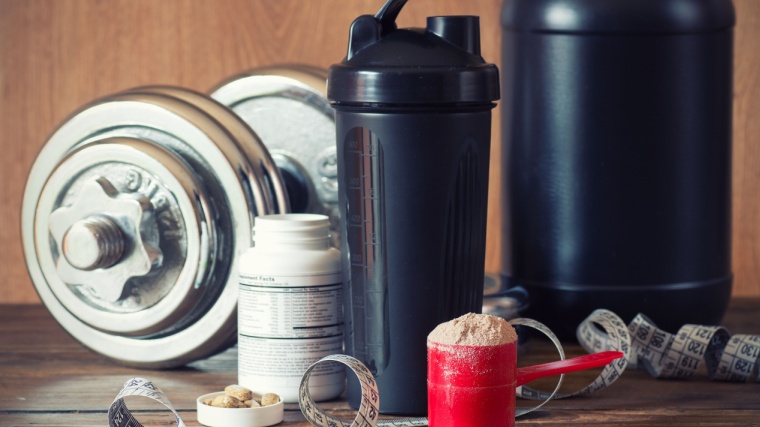Your supplement cabinet is packed and ready for a new week of training to help you get those gains you’ve been working hard for. If you’re anything like me, when you go to pop a scoop of creatine in your pre-workout supplement drinks, you may notice a few clumps. If it’s past the expiration date, you may wonder — is it safe? Does creatine go bad?

Here, I’ll break down what creatine is and how it works. I’ll take you through the latest research on the expiration dates of dietary supplements and which type of creatine has a long shelf life. Plus, I’ll give you tips on how to store creatine so you get the most out of your tub.
Editor’s Note: The content on BarBend is meant to be informative in nature, but it should not be taken as medical advice. When starting a new training regimen and/or diet, it is always a good idea to consult with a trusted medical professional. We are not a medical resource. The opinions and articles on this site are not intended for use as diagnosis, prevention, and/or treatment of health problems. They are not substitutes for consulting a qualified medical professional.
What Is Creatine?
Creatine is one of the most popular, well-researched, fact-checked supplements on the market. Whether you’re serious about bodybuilding, weightlifting, or are a casual gymgoer looking to build muscle, you’ve probably come across it.
Creatine is an amino acid stored in your skeletal muscles and brain. Over fifty years of research suggests that taking creatine supplements while resistance training can boost exercise performance, muscle growth, and strength gains.
You can get creatine through supplementing with creatine products or foods with creatine. To do that, you can eat animal-based protein sources like red meat. Vegetarians and vegans can opt for foods that contain glycine, arginine, and methionine — the three amino acids that can stimulate creatine synthesis. (1)
Creatine is generally considered safe, with no harmful side effects for healthy individuals. The primary potential side effect is short-term water retention, which may cause bloating and temporary weight gain. (2)
[Read More: Does Creatine Make You Gain Weight?]
Different Types of Creatine
There are many forms of creatine on the market. Creatine supplements typically come in powder form; others come in liquid, cream, and salts.
Creatine monohydrate supplements are the most well-researched type of creatine supplements. Here’s what the science says.
- Research consistently shows that creatine monohydrate is the most effective form of creatine at boosting exercise performance, building muscle mass, and increasing muscle strength. (1)
- Creatine monohydrate boosts phosphocreatine stores by 15 to 40 percent, which increases your work capacity for higher volume training and leads to strength and muscle gains. (3)
Vast research insists that creatine monohydrate is more effective and safe than any other type of creatine. (2)(3)
Here are the other forms of creatine you may find at the shop, which are often combined with other ingredients:
- Creatine Ethyl Ester
- Creatine HCL (Hydrochloride)
- Buffered Creatine
- Liquid Creatine
- Creatine Nitrate
- Creatine Salts
- Creatine Serum
- Creatine Malate
- Creatine Citrate
Does Creatine Expire?
As with any product, you can check your creatine supplement’s expiration date (or expiry date). However, it may have a longer shelf life than it states on the label.
The United States Food and Drug Administration (FDA) started the shelf-life extension project (SLEP) to investigate whether drug products (including supplements) may have a longer shelf life than printed. They found that 88 percent of the products lasted at least one year past their expiration date, and most products had an average of 66 extra months. (4)

[Read More: BCAA Vs. Creatine Supplements — Which to Take and When?]
To find out when (and if) creatine expires, scientists measure its levels of creatinine, a waste product, to see when it starts to degrade. Higher levels of creatinine indicate that the creatine becomes less effective.
Creatine monohydrate powder has been found to be stable. At room temperature and high temperatures (104 degrees Fahrenheit), creatine monohydrate remained stable for over three years. At a high temperature of 140 degrees Fahrenheit, creatinine levels only rose after 44 months. (3)
So, before you throw out what you think is expired creatine, check the date of manufacture. Your creatine may still be good for three to four years after that.
Even if it does start to degrade, it becomes less effective, not necessarily dangerous.
This study also mentions that this is only true for creatine monohydrate powder. Other forms of creatine, like liquid creatine and creatine salts, may turn into creatinine more quickly. (3)
How to Store Creatine
While research indicates creatine monohydrate can last for three to four years, proper storage still matters. Here’s what to do when you get a new tub of creatine.
- Avoid Moisture: Store your new tub in a dry place in an airtight container to keep out moisture. Moisture can lead to mold and bacteria. You can keep it in the tub it came in; just close it tightly.
- Avoid Direct Sunlight: Keep your creatine away from direct sunlight to avoid high temperatures. A cool, dry place like a cabinet away from the sink will work.
- Check Consistency: Clumpy creatine doesn’t mean it’s expired. However, it indicates some moisture may have gotten in, so keep looking. Check for an unpleasant odor or a color, taste, or consistency change. If you notice these signs, then it may have gone bad.
How Does Creatine Work?
When you take creatine, your body stores it as creatine molecules called phosphocreatine. Higher phosphocreatine stores can increase your energy supply for lifting.
When you have more phosphocreatine in your muscle cells, your body is able to create and regenerate adenosine triphosphate (ATP) more quickly. ATP is your energy supply for short-duration, high-intensity exercises like weightlifting and sprint workouts. (5)
[Read More: 6 Creatine Benefits All Lifters Should Know About]
Without creatine, you burn through all your ATP in two to three seconds. If you’re deadlifting, you’ll fatigue and be done with the most powerful part of your set quite fast. With higher creatine stores, you get a few more seconds before fatigue, so you may be able to do a few more reps. Over many sessions and weeks, more volume leads to more strength gains and muscle mass.
It doesn’t give you instant energy like pre-workout supplements. However, you no longer need a long creatine loading phase to gradually build your creatine stores. The International Society of Sports Nutrition (ISSN) recommends the following:
- Take 0.3 grams of creatine monohydrate per kilogram of body weight every day for five to seven days.
- Take three to five grams of creatine every day. Your creatine stores should increase within one month, and you’ll start to feel the gains.
You can take creatine at any time of day; it just needs to get in your system consistently.
Takeaways
- Creatine is an amino acid found in your brain and your muscles.
- Creatine is the most well-researched and effective dietary supplement for boosting athletic performance, muscle mass, and strength gains when combined with resistance training.
- Research indicates creatine monohydrate is the most effective form of creatine. There are many other types of creatine available, including liquid creatine, buffered creatine, and creatine ethyl ester.
- Creatine monohydrate supplements may last up to three to four years past their date of manufacture. Your tub of creatine usually lists an expiration date of one to two years, so you can tack on another one or two.
- Even as creatine monohydrate degrades into creatinine, it only becomes less effective, and not dangerous. So, accidentally taking expired creatine should be okay.
- Store your creatine in a cool, dry place in an airtight container away from direct sunlight to keep moisture out.
- Clumpy creatine may not be bad if it doesn’t come along with a foul smell, taste, or different color.
- Creatine works by building up your phosphocreatine stores to help your body replenish ATP quickly. With faster ATP replenishment, you have more time before you fatigue in heavy lifting sessions, so you can crank out a few more sets and reps for a higher volume and more gains over time.
FAQs
How long does creatine last? Let’s answer some common questions.
Does creatine expire or go bad?
Creatine may go bad if it’s exposed to moisture, causing bacteria and mold to grow.
Why is my creatine powder getting hard?
Clumpy creatine may indicate that some moisture got in. That doesn’t necessarily mean it’s gone back. Check for a foul odor, taste, or different color — if those are present, it’s time to toss the tub. But otherwise, you might still be good to go.
How do I tell if creatine has expired?
Expired creatine will have an unpleasant smell or appearance. It may also change in taste or consistency.
How can I keep creatine fresh?
Utilize proper storage tips. Store it in an airtight container in a dry place away from direct sunlight, and shut it tightly every time.
References
- Kreider RB, Kalman DS, Antonio J, Ziegenfuss TN, Wildman R, Collins R, Candow DG, Kleiner SM, Almada AL, Lopez HL. International Society of Sports Nutrition position stand: safety and efficacy of creatine supplementation in exercise, sport, and medicine. J Int Soc Sports Nutr. 2017 Jun 13;14:18.
- Antonio, J., Candow, D.G., Forbes, S.C. et al. Common questions and misconceptions about creatine supplementation: what does the scientific evidence really show?. J Int Soc Sports Nutr 18, 13 (2021).
- Jäger R, Purpura M, Shao A, Inoue T, Kreider RB. Analysis of the efficacy, safety, and regulatory status of novel forms of creatine. Amino Acids. 2011 May;40(5):1369-83.
- Lyon RC, Taylor JS, Porter DA, Prasanna HR, Hussain AS. Stability profiles of drug products extended beyond labeled expiration dates. J Pharm Sci. 2006 Jul;95(7):1549-60.
- Dunn J, Grider MH. Physiology, Adenosine Triphosphate. [Updated 2023 Feb 13]. In: StatPearls [Internet]. Treasure Island (FL): StatPearls Publishing; 2024 Jan-.
Featured Image: Lecic / Shutterstock